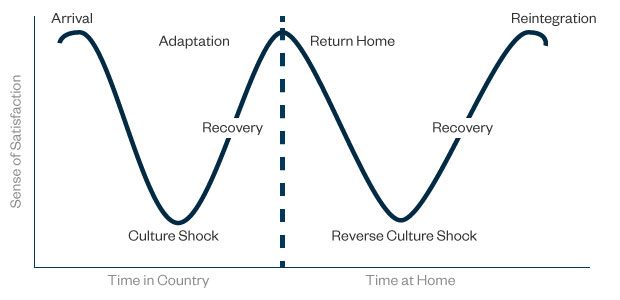During your study abroad, orientation you will probably be told about the emotional curve that is associated with students’ feelings during their study abroad trip. I remember looking at this chart and being surprised by some of the feelings the chart includes and even being surprised by the fact that it talks about staged of feelings after you have returned home.
The first stage is the arrival stage, I would say that this stage also includes the tine before you land in you chosen country. This stage consisted of nervousness, excitement, preparation, and planning which all can be connected to positive feelings. It is exciting to us to prepare for our trip and plan outfits and all the activities we want to do while on our trip. The time between arrival and the culture shock stage is considered the honeymoon stage where you are meeting new friends, exploring your country, and you are having a highly positive experience.
There is no specific time of when the next stage stops or how long you might be in one stage. After the arrival/honeymoon stage comes the downward slope that leads to the culture shock phase. In my opinion, the severity of this phase depends on what country you chose to study in and how familiar you are with the country before your trip. One of the major culture shocks I experienced had to do with traveling through London and the fast-paced life style. The best way that I found to helped me overcome the culture shock that I was experiencing was to fully immerse myself in what made me uncomfortable. I took the underground trains and over ground trains constantly so that I could become comfortable and knowledgeable about that transportation system.
After the culture shock stage comes the recovery stage, when you are starting to adapt to the lifestyle and become more familiar with your new living situation. Putting yourself in uncomfortable situations and doing what you can to explore your new city can help speed up this process. This is the last stage of the in-country emotions chart; however, you could go through these stages’ multiple times throughout your program. Do not be alarmed if you start to feel these emotions multiple times, it is completely normal and expected.
It may surprise you to know that when you return home you will feel this process of emotions once again. When you first return home, it is exciting to be in a place familiar to you and with you family members/friends that you have not seen for months. This equated to the honeymoon stage that I previously talked about that then leads into the downslope that is reverse culture shock. Reverse Culture Shock happens because you have worked so hard to adapt to a new lifestyle that when you transition quickly back to you regular lifestyle it can be hard to process that transition. With that quick transition will come a speedy recovery phase and your brain and emotions will transition back into your normal lifestyle and lead to a reintegration process of you into your life before your trip.
In my experience, I did not have the time at home phase repeat the honeymoon etc. stage I stayed consistent with feeling reintegrated. I hope this article helped you identify some emotions you might be feeling and give you resources on how to help remedy the negative feelings and celebrate the positive ones.

